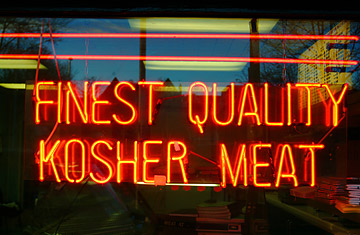
Rosh Hashanah is more than 10 weeks away, but Peter Swerdlow sees trouble coming. Swerdlow is the owner of Atlanta-based Griller's Pride, which delivers kosher meats and cheeses directly to families in several Southeastern cities. And a U.S. immigration raid at the nation's largest kosher meatpacking plant is making it impossible for him to plan for the flood of orders that always come in for Jewish New Year celebrations. "This little fiasco at this plant has caused the most awful shortage of beef and my gut feeling is it's going to get a lot worse before it gets better. And what it's doing to prices is horrific."
The "fiasco" was the arrest in May of 400 people at the Agriprocessors Plant in Postville, Iowa. While nearly 300 of the workers pleaded guilty to using false Social Security numbers, plant managers have been accused of cutting costs by underpaying and mistreating employees. The plant has reopened, and the Rubashkin family, which owns it, says it is dedicated to restoring the company's reputation. But the damage is already substantial. The raid has compounded the effect of droughts, fires and the cost of fuel to generate a nationwide shortage of kosher beef. Prices have soared anywhere "between 5 and 30%" says Swerdlow, who stopped buying Agriprocessor products years ago but now suffers from the price swing and consumer worries.
Kosher consumers are concerned because of ethical issues. Customers call Swerdlow "to make sure we don't use [Agriprocessors] products because of their business practices. When the trust is lost, it takes a lot to put it right."
For example, Nashville's relatively small Jewish community has never had it easy keeping kosher. Serving the city's 8,000 or so Jews are just one kosher deli, one vegetarian kosher restaurant and a handful of caterers. While Agriprocessors' kosher practices haven't been questioned, allegations over their business practices have provoked outrage and unease among Jewish congregations. "They are concerned about human rights violations, about fraud if people had false Social Security numbers, and because it's a Jewish-owned company. You would hope that a Jewish-owned company would live up to higher standards," says Rabbi Saul Strosberg of the Orthodox Congregation Sherith Israel.
"People are wary now," says Denese Kasman, with the Conservative West End Synagogue. "If you go to a grocery store, you really can't tell which meat packer processed the food, so you're taking a chance." Kevin Alexandrani, owner and chef of Sova Caterers, says his solution to the Agriprocessors raid has been simple: "Basically, we've been cutting back on beef. In Nashville, non-kosher brisket is two dollars a pound, but for kosher, you can expect to pay $10 to $15 a pound, and that was before the whole immigration bust. So we've switched to chicken and turkey."
